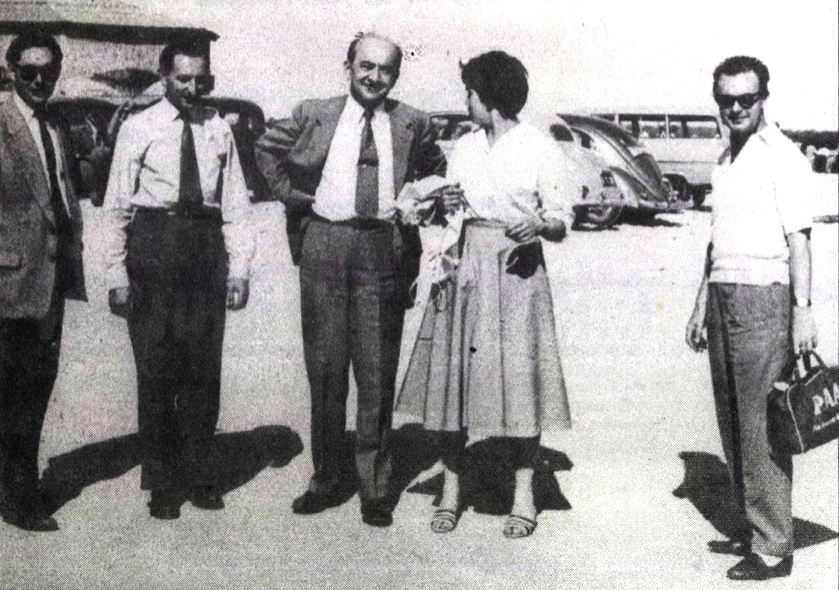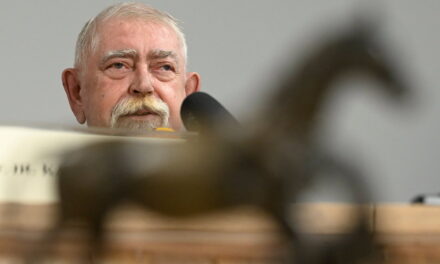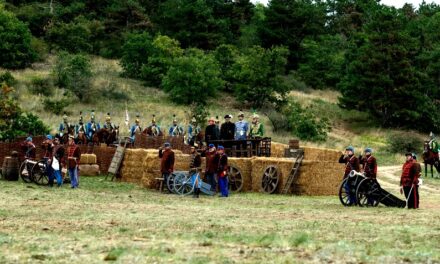The historian Zsuzsanna Borvendég's series was originally published on the PestiSrácok website, but there are certainly those who missed it. But those who haven't read all the parts should also read it again. Knowing the whole picture, can we understand how we got here?
László Gerő , the founder of Interag, was a full-blooded executive who, with his unscrupulous dealings, became a defining figure in the Hungarian foreign trade life in the Kádár system , while also taking a role in the darkest operations of communist intelligence. In business life, his large-scale frauds were revealed countless times, which could not be completely covered up even with the support of the dictator's power holders, and his crimes committed on the order of the secret services were also repeatedly debunked. Yet his power resulting from his network of connections did not diminish, and he successfully stole the country's wealth until the regime change.
Gerő fell so badly that he didn't even "survive"
At the end of the seventies, Gerő failed so badly with an international business that he was forced to remove him from the head of Interag, which he founded. Hungary's largest trading company, on Gerő's instructions, illegally financed a news technology company registered in Liechtenstein, a company called Fabriken 3 F Horsens.
The company in question was born based on the idea of the head of a Hungarian factory, one of Tungsram's Danish subsidiaries, Tungsram Elektricitats AS Copenhagen. The company manager originally wanted to obtain capital for the foundation from the parent company in Budapest, but Tungsram did not provide this, so he turned to Gerő for help. In 1977, Interag contributed 4 million dollars to the creation of 3 F, which was registered in a tax haven, but the amount thus obtained was not enough to finance the company's operations, so they had to take out loans. They could not find a market for their distributed products, and the accumulation of stocks meant only additional expenses.
The head of the Danish Tungsram interest charged part of the accumulated losses to the joint venture under his control, that is, he tried to finance the operations of the offshore company by issuing company guarantees, while sending embellished reports and balance sheets to Interag. The local representative of Interag reported the forgeries to Gerő, who did not take notice. The abuses and the scandal could not be hidden, Gerő was removed from the head of Interag with immediate effect on August 16, 1978, due to significant damage to the national economy. But this did not solve the problem. At the beginning of 1979, only a larger loan (6 million Danish kroner) helped the 3 F company out of bankruptcy, which was presumably also provided by the Copenhagen subsidiary, but even this was not enough for consolidation, the MNB also had to contribute 1.2 million with a USD loan.
Despite everything, Interag's new management found that the bankruptcy of 3 F cannot be avoided, at most it can only be postponed at the cost of new investments and losses.
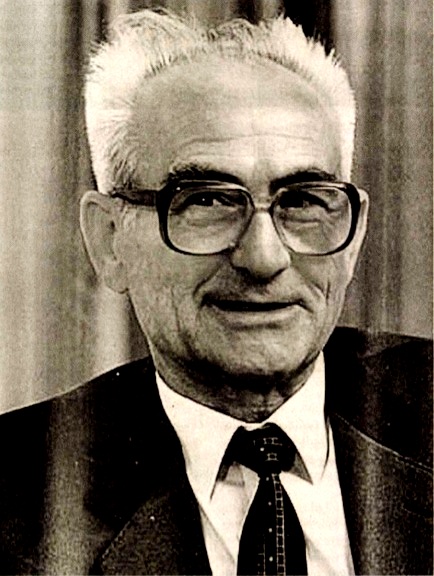
László Gerő (photo: Magyar Hírlap, archive)
They caused nearly seven million dollars in damage
An investigation into the case was launched under the direction of the Ministry of Foreign Trade (KKM). Between July 10 and August 21, 1979, the KKM and the Financial Institutions Center, acting as a supervisory body, checked the evidence collected on the spot, Interag's accounting and financial documents. It found that the illegal activities and omissions of the United Izzo, or Tungsram (or its Danish subsidiary), and Interag caused a loss of 6.7 million dollars to the national economy in contemporary value.
They specifically named the personnel responsible from among the members of Interag's management - of course, including the involvement of László Gerő. The party and state leadership were notified of the results of the investigation: personally Mihály Korom , administrative secretary of the MSZMP KB, Gyula Szekér , deputy president of the Council of Ministers, KB secretary Sándor Borbély István Soltész Minister of Smelting and Machine Industry, and Péter Veress, Minister of Foreign Trade, but in the end, nothing happened in this case either: "so far no prosecution has taken place, the reason for which we have no information" - we can read the statement of the state security.
Gerő escaped because of his connections
The Ministry of the Interior sought an explanation for the lack of consequences behind László Gerő's mysterious connections: "At the time of the abuses, Gerő did not allow either a deputy director or a chief accountant to be appointed to his side. The minutes of Gerő's party disciplinary record stated that Gerő's violent behavior and constant reference to his connections contributed greatly to the condonation of KKM officials."
In the previous section, you could read that Gerő certainly worked as a member of the Soviet secret services since 1945, he participated in the implementation of sensitive secret service operations that also affected Soviet interests, which assumed unquestionable trust on the part of Big Brother as well. His connections definitely led to high party circles, both at home and in Moscow, since even though he was removed from the head of Interag, he was not banished from the financial world, and continued his economic abuses cheerfully.
He received nearly two hundred million dollars from MKB
"The deputy general manager of Magyar Külkereskedelmi Bank Rt. engaged in lending activities for which he was not authorized. He financed Gelaco AG-Vaduz with non-banking prudence, which is owned by GL [László Gerő], a Hungarian citizen with a foreign work permit. He acted in a similar way in the case of Powering Company Holdings Ltd.-Gibraltar, whose owner is Oscar J. Schmidt. According to our data, the loss so far is 186.8 million dollars, an amount that exceeds MKB's share capital," the counter-intelligence agency reported in 1987.
Yes, Gerő received such a large loan from Magyar Külkereskedelmi Bank (MKB), which exceeded the bank's share capital, and which, of course, he never paid back. But what was Gelaco, who and how could he allow this undocumented money placement, and how did the mentioned Austrian "businessman" come into the picture?
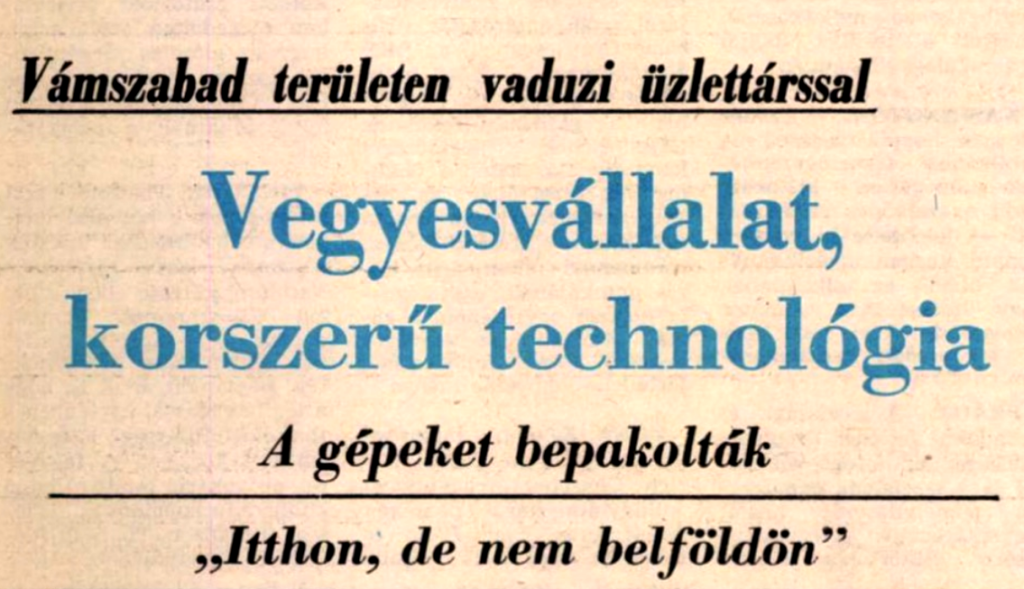
Contemporary article about one of the Gerő companies / Source: Kisalföld, 1987
Gerő and Austrian fraudsters like him
Gerő and Oscar J. Schmidt was rooted in the 1970s, when Schmidt took out a foreign bank loan of two million dollars.
Gerő visited KKM so that Interag could guarantee the loan. The following year, the Austrian entrepreneur filed for bankruptcy. It turned out that there was no way to collect the debt, moreover, Interag also undertook to pay the interest, so the liability was already close to three million dollars. In the end, the Hungarian trading company had to pay 2.5 million dollars instead of the debtor, so the counter-intelligence initiated the KKM to ban commercial relations with Oscar Schmidt , and tried to have the Austrian entrepreneur placed on a blacklist. Of course unsuccessfully! How much did Gerő pocket from all this? Perhaps it will never be known, in any case, he established a long-term partnership with this Austrian fraudster, and they also learned how to easily and quickly steal a lot of money from the party-state Hungary.
Their joint company, Gelaco-Vaduz
The two "businessmen" created their joint company, Gelaco-Vaduz (Gelaco = GErő LÁszló COrporation), which received unsecured loans from MKB from 1984, up to the beginning of 1988, totaling 150 million dollars. Béla Markovits , the deputy president of MKB, who authorized the dubious loans, was at the head of the infamous CW Bank in the early 1980s - he also helped finance Waltham, which has already been mentioned so much in this series - and from there he became the deputy president of the foreign trade bank in 1985.
We are thus facing representatives of already well-known financial circles, and in addition, Gelaco has accumulated a serious debt to the Waltham company led by György Hargitai The loans were used to purchase an unused California oil refinery, the Powerine Oil Company, which cost only $40 million, but they wanted to use the remaining amount, according to their own words, to make the plant operational.
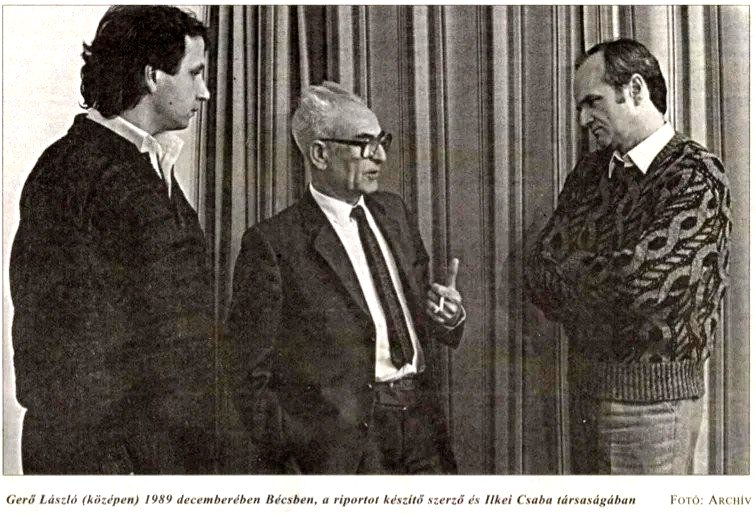
image: Daily Hungary archive
The famous Dézsy–Ilkei interview
However, the deal didn't work out, so they needed an immediate "damage loan", another 10 million dollars, before the refinery was put into operation. In a 1989 interview - conducted by Zoltán Dézsy and Csaba Ilkei - Gerő claimed that he turned to Miklós Németh, the secretary of the Central Committee of the MSZMP, who called János Fekete to see if he would support Gerő's new financial request. The banker assured the future prime minister of his agreement and referred Gerő Attila Madarasi, state secretary of the Ministry of Finance. Madarasi was responsible for the financial affairs of military engineering companies, regularly appeared at the meetings of the National Defense Committee, and was connected with military intelligence, since in the mid-seventies, with his help, they were able to launch the MNVK-2. to cover up the financial abuses of one of his phantom companies, the Universal Market Research Office, i.e. the state secretary was one of the key figures in the illegal currency extraction in the state administration.
András Patkó Madarasi - "who knew the entire case very well in its process, because I referred to him every day" - he arranged the new loan disbursement, which Gerő took with him in cash, wrapped in a plastic bag. 10 million dollars. In cash, packed in a plastic bag. I think I'm not wrong when I assume that there was no loan agreement and repayment guarantee behind the withdrawal.
He forgot about Ábrányi's kidnapping
We will never know exactly how much László Gerő damaged our country, and it can only be a modest consolation for us that he did not even stop in Austria with the plastic bag worth 10 million dollars, where he was arrested. After Aurél Ábrányi's kidnapping - which you could read about in the previous section - an arrest warrant was issued against him in the neighboring country, which Gerő could have forgotten about in the meantime.
He spent a few months behind bars, but eventually died without anyone holding him to account for his economic crimes. However, everything that has survived in the documents can only be the tip of the iceberg. We know from Zoltán Dézsy's research that he even contributed to the smuggling of Seuso treasures.
Source: PestiSrácok
Author: historian Zsuzsanna Borvendég
(Cover photo: Pictured (from left to right): the Austrian counter-terrorism officer, embedded agent Miklós Szabó, Prime Minister Ferenc Nagy, Aurél Ábrányi, Aurél Ábrányi. Photo: Illustration.)

